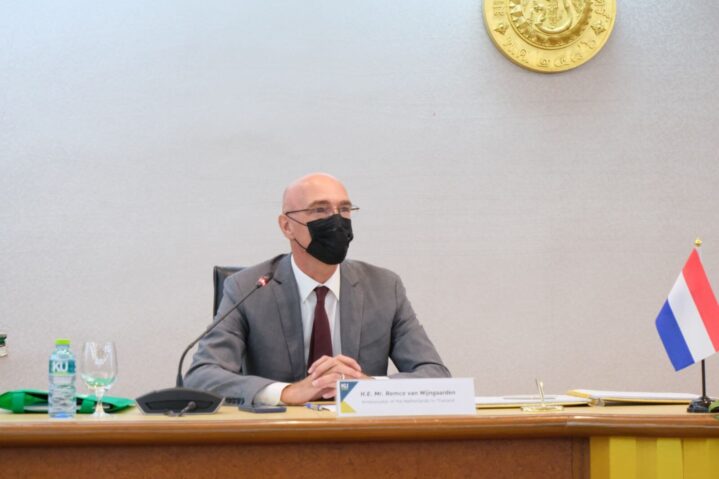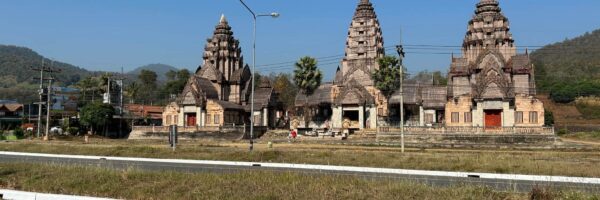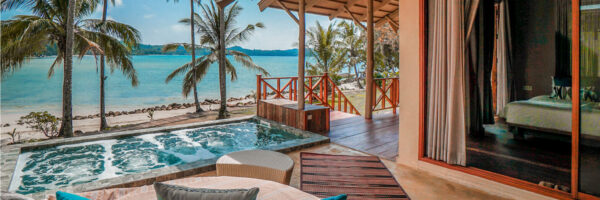
The Ambassador of the Kingdom of The Netherlands to Thailand
Expat Life sat down with the Ambassador of the Kingdom of The Netherlands to Thailand, Laos and Cambodia, H. E. Mr. Remco van Wijngaarden, in the elegant, serene and delightful surroundings of the Netherlands Embassy on Wireless Rd.
May I ask how long have you been in post in Thailand?
I have been in Thailand since the 1st October 2021. It was still the period where we had quarantine in Thailand so we spent 2 weeks in a local hotel and then I started work. Almost a year and as half now.
May I ask about your family, children?
Yes, my husband is a Dutch national named Carter, and we have 3 children, a 6 year old and the twins will be 4 in March.
Where were you posted before Thailand?
My last posting was China in Shanghai for 3 years as Consul General working mostly on consular affairs on the one hand, trade and investment promotion on the other hand. Before that I had two postings in The Netherlands one of which was as Head of Consular Affairs which was looking after Dutch communities abroad mostly when they encountered difficulties overseas. Working on prison policies, detainees, working a lot with Thailand, as it is one of the countries where we have most consular cases. There is a significant Dutch community here and it is a favourite holiday destination for the Dutch people. We have a large Consular section here. Before that I was posted at the United Nations in New York and Geneva. Posted in Indonesia at the political department and in Kosovo, then in The Netherlands and Nigeria.
So you are a career diplomat?
Yes I started in 1993 and always wanted to be a diplomat as I grew up as a kid in Madagascar as the son of an expat who was permanently based there since I was 5 years old. I went to an international school in Madagascar and I grew met with diplomatic children so I was always curious about that job. I liked international relations, was always reading the newspaper, listening to the radio those days. My father was working for Radio Netherlands – the news service comparable to BBC World. They had a short wave radio station in Madagascar. That’s how I got into news and my father became an Honorary Consul at one stage. I found that utterly fascinating, taking care of Dutch people that got into difficulties in Madagascar.
So when I finished studying in The Netherlands I applied for the Ministry of Foreign Affairs and strangely enough they hired me!
Where did you study in The Netherlands?
I first did a Bachelors in Arnhem in the East of The Netherlands, then I did my Masters in the University of Maastricht in the South. I am an economist by training and I worked for a few days a week as a student assistant whilst still studying. My first post was at The Ministry of Foreign Affairs in The Hague. I really enjoyed my first posting in Nigeria and have not left the Ministry since. I have also had a few secondments on loan to other Ministries. I have been on loan to the United Nations and the OSCE so I have had some outside postings. But always on behalf of the Ministry of Foreign Affairs.
How big is the Dutch community in Thailand?
It is quite big but there are no official figures in our embassy as there is no registration obligation. If people do register, they tend not to unregister so you never have a fully updated database. In general we estimate that 200 – 250,000 Dutch people visit Thailand as tourists on a yearly basis pre Covid and we think that we will soon recover to those figures. And permanently or semi permanently we think that there are between 15/20,000 people living in Thailand. We have a lot of people that are here a few months of the year who are still ‘officially’ living in The Netherlands but they spend 3/4 months here to avoid the cold weather. They often have a house, here, and soemtimes a family, partner or business interests.
What are the big Dutch employers here?
There are a number of big ones here as The Netherlands is the biggest EU investor in Thailand. Shell and Unilever, Friesland Campina the dairy, milk and yoghurt company, we have the big chemical companies. We have NXP, a large semiconductor manufacture, we have a lot of small and medium enterprises here that together employ a lot of Thai people. We have companies working in agriculture, we have some large seed companies working for the Thai and Asia markets. A large number and very diverse and we are a big investor in Thailand. But the European countries that have been here for a while, their relations were all built on trade. We have been here now for 419 years in Thailand. We were one of the first European countries, since we were already trading internationally a lot back then. Portugal and the French were here before us.
This embassy building is beautiful?
It is but this is not the one where we started in Thailand. In 1601, the ships “Amsterdam” and “Gouda” arrived in in Patani to buy pepper and other merchandise. Trading offices were set quickly afterwards. In 1608 King Ekathotsarot allowed the Dutch Old East-India Company company to establish their first trading post in his capital of Ayutthaya. Siamese ambassadors were sent to Holland and were received in audience by Prince Maurice of The Netherlands. In 1634, a two storey brick building to represent Dutch trading interests was built. This is how our diplomatic relations started. The original building has gone but we started a museum there. The former Queen of The Netherlands when she visited Thailand, she gave the gift of a National Museum so there is now a Dutch Museum on that same compound, built new. It is called ‘Baan Hollanda’.
We purchased this embassy in 1947 and it is one of the houses that was built by a Thai national we made it into a beautiful park. The building is beautifully maintained and it was renovated a few years ago. My family lives in the official residence.
I was pleased to see the inevitable bicycles on the site as I arrived.
We then had a three way conversation on the current blight of motorised scooters in Holland and the use of bicycles and a ‘buckfeest’, a cart in front of the rider, where you can put your children, animals, shopping.
The ambassador said he hoped that Bangkok could do with being more bicycle friendly and that there are many large cities in the world that have developed bicycle options. We discussed the fact that Thailand had discussed having an elevated level for pedestrians and bicycles but he mentioned that is a huge investment. He mentioned the Green Bridge been Benjakitti and Lumphini Parks but most people run and walk.
When I had a discussion with the Governor of Bangkok Khun Chadchart Sittipunt, he asked for advice on how they could make Bangkok more cycle friendly. We both agreed that Khun Chadachart was popular with the Thai people and was perceived to be open and doing things ‘for the good of the people’. The work he does is noticeable. His work in sustainability, water management is of obvious interest to the Dutch government. It offers a lot of opportunity for the Thai people in Bangkok to improve this beautiful city, as I really like Bangkok a lot, the ambassador said.
He told me that The Netherlands is often contacted by other countries that envy their bicycle culture. We actually have “a cycling embassy” in The Netherlands that other countries reach out to on how to change their cities to be more cycling friendly.
You have been here a year and a half you must have travelled the country quite a bit?
Yes as soon as the restrictions of Covid-19 were relaxed. The basic reason is that the Dutch community are everywhere in Thailand – Hua Hin, Phuket, Chiang Mai, Pattaya, Esan – Khon Kaen, I have visited these places a few times. I try to travel as much as possible to visit Dutch companies that are based here to see how they are faring, so I am doing quite a lot of work related visits. I also visit Cambodia and Laos as I am the Ambassador to those countries as well. My job is that I am not just the ambassador of the embassy in Bangkok but of Thailand so I try and travel around the country, the three countries, to meet the Dutch people and see Dutch businesses wherever they are.
I told him that I was now living in Hua Hin a city that he really likes and he said that the last time he went was to attend the Dutch Association Gala Dinner.
The visit that made the biggest impression on me was the visit to the war cemetery in Kanchanaburi. I go there twice a year, once for the Dutch ceremony and once for the British ceremony, it is an impressive site but also a very sad page in history. I think that most of us saw the film ‘The Bridge over the River Kwai’ when we were young. I did not know until I read about it that there was such a large Dutch contingent that died building the railway. More than 2,000 Dutchmen are buried here in Thailand. The second biggest foreign nationality that died there. What is also sad is the number of Asians that died while building the railway track.
- The notorious Burma-Siam railway, built by Commonwealth, Dutch and American prisoners of war, was a Japanese project, driven by the need for improved communication to support the large Japanese army in Burma.
- Approximately 13,000 prisoners of war died and were buried along the railway. An estimated 80,000 to 100,000 civilians also died in the course of the project.
- The railway is 250 miles (402 kilometres) long and was completed in December 1943.
- The ‘Death Railway’ starts at Nong Pladuk, 80km west of Bangkok.
Europe is experiencing a tough time at the moment, economically and the world is changing. The world is now focussed on the SE Asian countries and you have three of them here. Bangkok is a very important city for a posting at the moment. China and India perhaps less so in the past the smaller nations are becoming more important.
Yes The Netherlands was one of the first countries to have an Indo-Pacific strategy. We realised quite early that this region is where economic growth will come from, where a lot of geo-political developments are taking place and this is the region where the future of our planet is going to be co-determined. Not only here in Asia but what is going on in the rest of the world. The Indo-Pacific is very important for us. That makes Thailand a very important country to have a strong presence in.
Do you have educational exchange programmes between the two countries?
No we stopped those that we had. There is a great deal of cooperation between Thai and Dutch universities historically so but the Dutch government stopped funding Thai students going to The Netherlands. It is a country that many international students are drawn too because we have good international system that is also affordable. Especially universities that have English language and Master’s programmes quite good and relatively affordable for foreign students. The other two areas that I would like to invest more time too would be water management and agriculture so those are areas where we do work together closely but I want to encourage more cooperation. The flooding, rainy season and climate change and the effect of water in Thailand. It rains more but it is drier at the same time so the difference in the levels of groundwater and flooding is extreme in Thailand. That’s where we compare quite a bit, we are both low level delta countries that have water management issues so I think that we have to work together. The second issue is agriculture. As you may know The Netherlands is the second biggest exporter of agriculture products in the world for such a small country. Thailand is also a big exporter and they would like to work closely with us and we would both like to make agriculture more sustainable. We are doing a lot in sustainability and circularity in agriculture these days so we would like to share our experiences with Thailand.
The Dutch were known as the ’traders of Europe’.
We still are!, he said laughing. We still have the biggest port in Europe. In the 17th Century we were the number one world power as we were the biggest trading country and we had ships that had technological advantages over other country’s ships. This is what we call our ‘Golden Ccentury’, and this is when Amsterdam was built. We were extremely rich, when almost all trade in Europe went through The Netherlands. We are still a trading country but not the biggest in the world anymore.
I thanked Remco and Martine his Communications Officer and we said that we would meet again soon. An extremely cordial meeting.
Editors note. The name Holland is often used to describe The Netherlands even though Holland is only a part of The Netherlands. The fact that the alliance existed of seven independent counties explains why the country is called The Netherlands.



